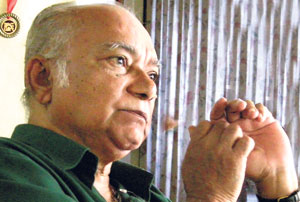Azdak in Unuwataye Kathawa. Piyal in Gamperaliya. Sudu Seeya in Doo Daruwo. These three characters symbolise the sea of talent that versatile actor Henry Jayasena possessed in the three visual media — the theatre, cinema and television. The curtain call has come. Henry is no more.
Professor Ediriweera Sarachchandra who picked Henry to play Prince Maname once paid this tribute to him: "When I look back to a time dating from the early fifties which marks the beginning of modern Sinhala theatre, I see a figure striding across, like a colossus, nearly four decades in time, and in these peregrinations, enriching all areas in the fledgling Sinhala theatre. A most unassuming figure, not seeking the limelight, not indulging in pettifogging or image-breaking, which has become the pastime of most people, especially in the field of art, but continuing without fanfare in the field that he has selected for himself, in which he finds his greatest satisfaction."
 |
Largely because of his acting talent, we tend to forget most of Henry’s other creative abilities. A disciplined dramatist, he planned his rehearsals and insisted on punctuality, and was hell-bent on starting a drama on time. His excellent writing skills — he wrote the scripts of his productions and authored many books — brought out his versatility in both prose and verse. He had the ability to write lyrics and also sing them.
His dominance in the field of arts made us overlook his aptitude for administration. Having spent many years at the Record Room of the PWD (Public Works Department) at Colombo Fort, he moved over to the National Youth Services Council as its Arts Director and later to Sri Lanka Rupavahini Corporation as Deputy Director-General in charge of programmes.
I first met Henry in the mid-1960s for a lunch-time chat at the PWD Record Room and we stayed in touch over the years. By then he had made a name for himself with such successful plays as Janelaya, which was based on city boarding life, and Kuveni, which gave a new interpretation to the old story. Both Janelaya and Kuveni were presented as stylised dramas (this was the 'Maname-niac' era). His other greats were the beautiful pastoral story Thavat Udesanak, Manaranjana Wedawarjana, which was an attempt to take a detached view of the strikes that were a common feature at the time, and Ahas Maliga, a translation of Tennessee Williams’s The Glass Menagerie.
Henry was quite at ease in English drama. When I first met him he was rehearsing his role in Ernest MacIntyre's The Crucible. (He had earlier played in Mac's The Full Circle of the Chalk.)
Then came his big moment: Hunuwataye Kathawa. Henry turned this Bertolt Brecht's classic into an unforgettable drama in the Sinhala theatre. It was big in many ways — big cast, big production, big orchestra (playing unusual instruments ‘invented' by maestro Shelton Premaratne) and, of course, big crowds. It not only became a landmark event in theatre in Sri Lanka, but also produced some excellent performances, particularly by Henry's wife Manel, playing Grusha the palace maid, and Henry himself as judge Azdak.
By this time Henry had made his mark in cinema as well — not as a popular romantic hero but as a serious actor. His restrained portrayal of Piyal in Gamperaliya was appreciated by many, prompting critic Philip Coorey to comment that it "gives depth to a characterization which could easily lapse into the stock of the staunch lover". Describing him as the "relatively unspoilt actor", Lester James Peries noted that "his performance is so subtle and so quiet that even he himself thought that he was better in other films where I personally think he was over acting”.
Henry gave life to Perera Mahattya in Handaya, Titus Totawatta's much acclaimed children's film. He turned out some fine performances in G.D.L. Perera's Dahasak Sithuvili, Dharmasiri Bandaranayake's Hansa Vilak, Lester’s Baddegama and Kaliyugaya and Dharmasena Pathiraja's Soldadu Unnehe. In these films, he demonstrated his versatility in portraying varied characters with ease.
When he moved over to the small screen, Henry again picked characters who suited his maturity in age. Doo Daruwo stands out among them.
Much more were his achievements over five decades. He could look back with satisfaction that he trained a fine set of players through 'Nalu Kela' and gave his best when invited to perform, be it in a film or a teledrama, and above all provided quality fare for the audience.
Henry documented his journey in theatre in two volumes — Karaliyaka Kathavak and Nim Nethi Kathavak. When he was struck down with cancer, he fought courageously and related the story in Balha Gilano, encouraging everyone to fight the deadly disease. I remember the day he launched the book at the National Library Services Board. He could not speak and tears started pouring down his cheeks when he was handing over copies of his book to the nursing staff.
He has left behind enough material that will come in handy for researchers and students of theatre. His life and work is documented in a commemorative volume of 'Abhinaya', a publication of the Sinhala Drama Panel of the Arts Council. Eagle Insurance recognized him with the Award of Excellence.
Henry was a caring husband, loving father, interesting conversationalist and simple individual. Above all, he was a fine human being. |

